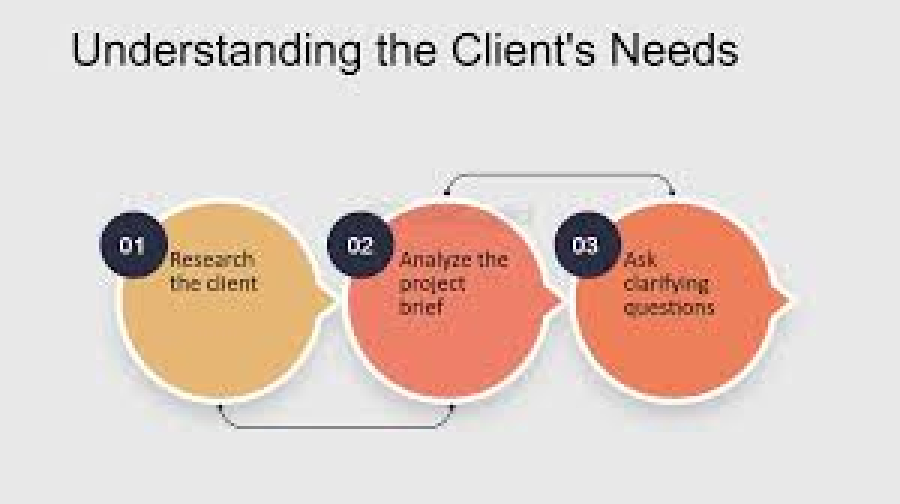The Importance of Understanding Client Needs
Understanding your client’s needs is the cornerstone of a successful freelance career. Whether you’re a web designer, writer, or marketer, delivering exactly what your client wants—and even anticipating their needs—can set you apart from the competition. At FreelancerBridge, we believe that building strong client relationships starts with truly understanding their goals, challenges, and expectations. In this guide, we'll explore why understanding client needs is critical for freelance success and how you can ensure you're always on the same page with your clients.
Long Description
To thrive as a freelancer, it’s essential to grasp not only the technical skills related to your services but also the art of understanding and responding to client needs. When you have a deep understanding of what your clients want, you can deliver higher-quality work, improve client satisfaction, and build long-term relationships. Here’s why understanding client needs is so important and how you can use it to enhance your freelance business:
Building Strong Client Relationships
Understanding your client’s needs is the foundation of a successful relationship. When you take the time to truly listen to their concerns, challenges, and goals, it shows that you value their input. This fosters trust and rapport, which are essential for maintaining long-term business relationships. Clients who feel heard and understood are more likely to return for future projects and recommend your services to others.
Delivering Tailored Solutions
Every client is unique, and understanding their specific needs allows you to offer tailored solutions that meet their expectations. By identifying their pain points, you can craft a solution that addresses their specific challenges rather than offering a one-size-fits-all approach. This demonstrates your expertise and commitment to providing value, which can lead to higher client satisfaction and more referrals.
Setting Clear Expectations
When you understand what your client wants, you can set clear and realistic expectations from the start. This includes timelines, deliverables, budget, and any other project-specific details. Clear communication about these aspects helps prevent misunderstandings and ensures that both you and your client are aligned throughout the project. Setting clear expectations also reduces the risk of scope creep, where a project grows beyond its original parameters.
Increasing Client Satisfaction
Client satisfaction is the key to repeat business and referrals. When you understand and meet your client’s needs, you are more likely to exceed their expectations, leading to a positive experience. Satisfied clients are more likely to return to you for future projects and will trust you to handle their most important work. Going the extra mile to ensure that your client’s needs are met not only helps in completing the current project but also establishes a solid reputation in the freelance industry.
Identifying Additional Opportunities
When you understand your client’s business and objectives, you can uncover additional opportunities to help them. For example, if you’re a freelance content writer and you realize your client needs help with social media strategy, you can offer to manage their social media content as well. By proactively identifying areas where you can add value, you not only expand your services but also position yourself as a trusted advisor.
Enhancing Communication Skills
Understanding client needs requires strong communication skills. As a freelancer, it’s essential to ask the right questions, listen actively, and follow up to clarify any ambiguities. Effective communication helps you gather the necessary information to meet your client’s expectations and allows you to share progress, updates, and challenges with transparency. Clients appreciate freelancers who communicate clearly and consistently, which contributes to a smoother workflow and better project outcomes.
Anticipating Future Needs
A great freelancer doesn’t just meet the current needs of a client—they anticipate future needs as well. By staying informed about industry trends, your client’s business developments, and potential challenges, you can offer forward-thinking solutions. Anticipating your client’s future needs and proactively proposing ideas can strengthen your position as a trusted partner and differentiate you from other freelancers who only respond to immediate requests.
Creating Value-Driven Proposals
When you truly understand your client’s goals and needs, you can craft value-driven proposals that show exactly how your services will help them achieve their objectives. Instead of just listing your qualifications, a well-understood client need allows you to connect the dots between your services and their business goals. This makes your proposals more compelling and increases the chances of securing the project.
Minimizing Revisions and Client Disputes
By understanding your client’s needs upfront, you can minimize the number of revisions or disputes during the project. A clear understanding of expectations ensures that you deliver work that closely aligns with what the client envisions, reducing the chances of miscommunication and dissatisfaction.
In conclusion, understanding your client’s needs is the cornerstone of a successful freelance career. It builds trust, improves communication, and allows you to deliver high-quality, tailored solutions that meet and exceed expectations. At FreelancerBridge, we believe that this understanding not only improves the quality of your work but also positions you as a valuable partner in your client’s success.


 by Emily
by Emily




